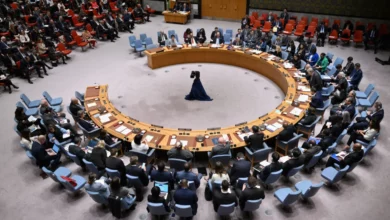Egypt will allow the vice president of Hamas' political bureau, Moussa Abu Marzouk, to move from Damascus to Cairo and stay in a permanent villa there, described as the "luxury" part of the prisoner swap consummated last week between Israel and Hamas, Israeli sources have revealed.
The deal, which will free Israeli soldier Gilad Shalit captured by Hamas in 2006 in exchange for the release of 1027 Palestinian prisoners, also includes transferring Hamas' headquarters from Syria to Egypt, the same sources added. Egyptian sources, though, could not confirm if this is true.
The head of Egypt's intelligence service General Mourad Mowafy with Hamas head Khaled Meshaal in Cairo on Thursday.
According to sources close to the Hamas, the two talked for two hours, during which Meshaal praised Egypt's role in the completion of the prisoner swap.
Informed sources told Al-Masry Al-Youm that Meshaal expressed appreciation for Egypt's role in taking Shalit out of Gaza and ensuring a safe place for Hamas leaders in Syria that Israel wants to permanently exile from the Palestinian territories.
Ofir Gendelman, the Israeli prime minister's spokesperson for the Arab media, said the names of the Palestinian prisoners included in the swap deal will be announced next Sunday.
Hamas leader Mahmoud al-Zahar said 1000 male and 27 female prisoners will be released.
Zahar told Egyptian state television Thursday that Hamas made sure to secure the release of captives belonging to several Palestinian factions, including some Syrian prisoners, and prioritized the sick, elderly and those who have been imprisoned for a long time. He expressed deep sorrow for not negotiating the release of the rest of the some 7000 prisoners.
"The exact time of the prisoners' handing-over will not be announced," an informed source in Gaza told Al-Masry Al-Youm, adding that this is to ensure the safety of the prisoners.
Palestinian Prime Minister Salam Fayyad said if Israel procrastinates in handing over the Palestinian captives it will be held fully responsible for their lives, noting that more than 200 Palestinian prisoners have died in Israeli prisons since 1967 due to medical neglect, torture and hunger strikes.
Palestinian Minister of Prisoner Affairs Issa Qaraqei also warned of the continued deterioration of Palestinian prisoners' conditions, which he said has become "very serious" in light of them entering the 18th day of their hunger strike. He added the Israeli authorities continue to ignore the prisoners' demands for better rights, threatening a "disaster."
Shalit has been informed of the swap deal and told he will be released soon, said Abu Ataya, spokesperson for the Nasser Saladin Brigades, the military wing of the Palestinian Popular Resistance Committees.
"I reported to Shalit that the deal has been finalized, and he said he would sue the government of the Israeli entity for failing to release him, as he was kidnapped years ago," added Ataya.
The deal came as a result of pressure exerted by Egyptian authorities on Hamas and the United States on Israel, the Israeli sources said.
An Israeli state television channel has displayed the content of some of the documents signed between Hamas and Israel.
According to the Israeli channel, the Palestinians had demanded the release of detainees for the 1948 Arab-Israeli War according to a certain process agreed upon by both parties, reducing the number of deportees to Gaza and abroad, approving the the release of 30 of 50 senior Palestinian prisoners in Israeli jails and those labeled as VIP prisoners, allowing Israel to choose who would be released and promising to deport some of them abroad.
The document had also included a claim for the release of all women and children, anyone who has spent more than 15 years in prison and all Palestinian prisoners detained before the signing of the Oslo Accords.
Israeli experts on the news channel said that Hamas has shown flexibility during recent negotiations, due to desire to relocate its headquarters from Syria to Egypt.
Translated from the Arabic Edition




